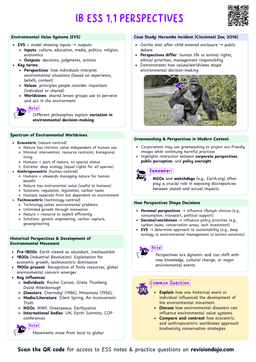Tragedy of the Commons
The tragedy of the commons is a concept that describes the overexploitation of shared resources due to the tension between individual self-interest and the collective good of sustainable management.
- The Tragedy of the Commons is a concept in environmental science and economics that describes how shared, unrestricted access to a common resource leads to its overuse, degradation, and eventual depletion.
- The term was first introduced by Garrett Hardin (1968), who used the analogy of a shared pasture (the “commons”) where herders, acting in self-interest, continue to add more livestock to maximize personal gain, ultimately destroying the pasture for everyone.
Core Principles of the Tragedy of the Commons
- Shared Resource: The resource (e.g., ocean fish, atmosphere, groundwater) is accessible to all but owned by none.
- Individual Self-Interest: Each user seeks personal gain (e.g., more fish, more livestock).
- Collective Loss: Overuse by all users leads to degradation, depletion, or collapse.
- Lack of Regulation: In open-access systems, there are no enforceable limits or accountability mechanisms.
- Unsustainability: The system ultimately fails because short-term profit outweighs long-term resource stability.
- “Commons” does not mean public property.
- It actually means a shared, unmanaged resource without clear ownership.
Environmental Implications
- Overexploitation: Natural resources are used faster than they can regenerate (e.g., overfishing, overgrazing).
- Pollution Accumulation: Shared sinks (like the ocean or atmosphere) accumulate waste since no one takes responsibility for clean-up.
- Loss of Biodiversity: As resources collapse, habitats degrade and species disappear.
- Reduced Ecosystem Resilience: The inability of ecosystems to recover from stress weakens global sustainability.
- The tragedy of the commons is not limited to extraction (like fishing).
- It also applies to pollution, where shared environments become “dumping grounds” with no accountability.
Mechanism of Resource Collapse
- Resource availability appears abundant: Users act independently to maximize personal benefits.
- Exploitation increases: Others follow suit to avoid losing out.
- Carrying capacity exceeded: The resource becomes degraded and cannot replenish itself.
- Collapse: Resource depletion leads to ecosystem and economic failure.
Grand Banks Cod Fishery (Newfoundland, Canada)
- Location: Grand Banks, off the coast of Newfoundland, one of the most productive fishing grounds in the world due to nutrient-rich waters.
- The Resource: Atlantic cod (Gadus morhua), a keystone species supporting local economies for centuries.
- Problem
- For decades, international fleets harvested cod without restrictions.
- Technological advancements (e.g., trawl nets, sonar) enabled massive overfishing.
- No single entity “owned” the ocean, so every nation sought to maximize short-term gains.
- Consequences
- Overexploitation led to population collapse by the early 1990s.
- The fishery was closed by the Canadian government in 1992, causing:
- Loss of 40,000 jobs in coastal communities
- Collapse of a multi-billion-dollar industry
- Disruption of marine ecosystems (as predators and prey relationships changed)
- Current Status
- Despite strict moratoriums and conservation programs, cod stocks have not fully recovered.
- Illustrates how open-access resources are unsustainable without regulation.
Plastic Pollution in Ocean Gyres
- Location: North Pacific Gyre, home to the Great Pacific Garbage Patch, between Hawaii and California.
- The Resource: The open ocean, a shared global commons that lacks direct ownership or regulation.
- Problem
- Accumulation of non-biodegradable plastics from land and marine sources.
- Plastics are carried by ocean currents and trapped in gyres (circular current systems).
- No nation takes responsibility for clean-up because no one owns the open ocean.
- Consequences
- Marine biodiversity severely impacted:
- Over 100,000 marine animals (e.g., turtles, seabirds, whales) die annually from ingestion or entanglement.
- Microplastics enter food webs, bioaccumulating through trophic levels.
- Long-term effects on fisheries, ecosystems, and human health.
- Ecosystem services such as carbon cycling and nutrient flow are disrupted.
- Marine biodiversity severely impacted:
- Current Efforts
- The Ocean Cleanup Project and international agreements (e.g., UNEP plastic reduction targets).
- Local and global campaigns to reduce plastic use, improve waste management, and promote recycling.
Preventing the Tragedy of the Commons
- Regulation and enforcement: Setting quotas, licenses, and penalties for overuse.
- Privatization or community ownership: Giving users a stake in long-term resource sustainability.
- International cooperation: Agreements like the UN Convention on the Law of the Sea (UNCLOS) for shared ocean management.
- Education and awareness: Promoting sustainable consumption habits and collective responsibility.
- Economic incentives: Taxing overuse or subsidizing sustainable practices.
- Define the Tragedy of the Commons and explain how it relates to sustainability.
- Describe Garrett Hardin’s original example and explain how it applies to modern resource management.
- Explain the causes and effects of plastic accumulation in ocean gyres.
- Discuss at least three strategies that can prevent or mitigate the tragedy of the commons.


